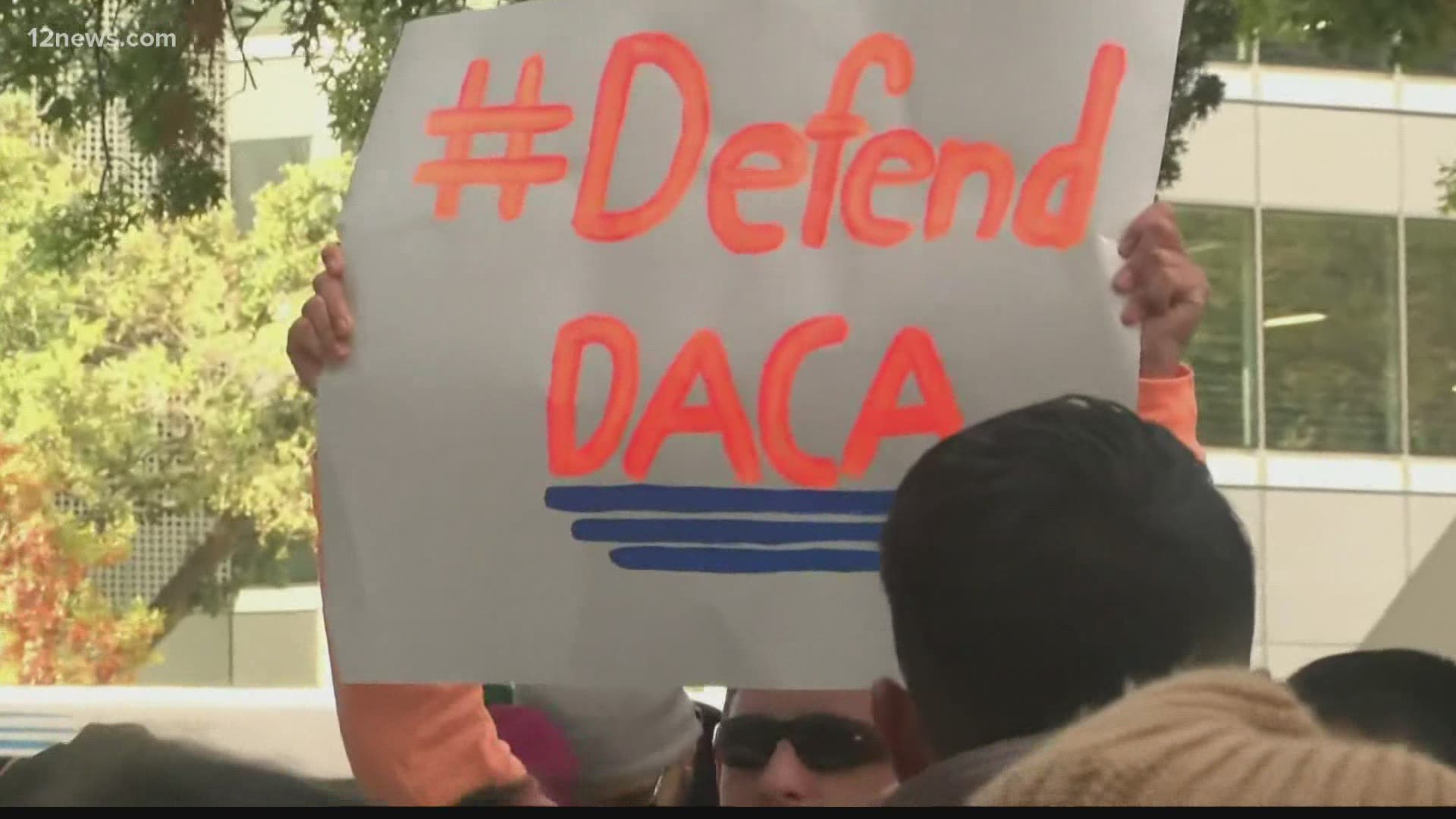PHOENIX — They say tomorrow is not guaranteed and for people who were unlawfully brought to the United States as children and protected under the Deferred Action for Childhood Arrivals program, every day is gut-wrenching fear of deportation.
For the nearly 650,000 DACA recipients there is a common denominator; this is the only country they’ve known.
In a large majority of the cases, they were brought to the U.S. as small children, and they considered themselves American most of their lives.
It wasn’t until they began to drive and apply for college that they found out about their immigration status and what limitations it entailed.
In 2012, then-President Barack Obama issued an executive order that allowed some individuals who don’t have legal status in the U.S. to receive a renewable two-year period of deferred action from deportation and become eligible for a work permit.
After surviving countless lawsuits and a Supreme Court ruling, the program is once again facing a new challenge after Texas Federal Judge Andrew Hanen blocked the program from moving forward, ruling it was unlawfully created.
The move stopped the Department of Homeland Security from processing new DACA applications.
The battle for DACA continues
“It was a gut punch,” said José Patino, a DACA recipient and policy director at Aliento, a non-profit that supports undocumented immigrants.
Hanen’s ruling came down Friday afternoon. Patino’s weekend plans immediately changed.
Patino began to get ready to explain to the thousands of students he works with daily and helps navigate the DACA applications that their future was once again uncertain.
“There was a lot of frustration because people had made plans about getting their first jobs, driver licenses, starting this life they want to have, but that was not an option anymore at this time,” Patino said.
It’s been nine years since the DACA program was established and over the years it’s been a rollercoaster of emotions for recipients.
For Patino, it’s given him a practice he says he wished he didn’t have, of dropping everything and quickly informing himself to pass along that valuable information to his immigrant community.
“It can be very difficult when you have all these hopes, dreams and plans, and all of them are on hold because [those] don’t only depend on yourself, but also your family,” said Patino.
RELATED: New Arizona ballot initiative would let voters decide if DREAMers can receive in-state tuition
What is DACA?
The DACA program is temporary protection from deportation that doesn’t grant legal status or a pathway to citizenship.
It allows recipients to apply for a driver's license, social security number and work permit.
Every two years, DACA recipients must renew their status.
Applicants must meet the following major DACA requirements:
- Entered the United States unlawfully prior to their 16th birthday
- Have lived continuously in the United States since June 15, 2007
- Were under age 31 on June 15, 2012 (born on June 16, 1981, or after)
- Were physically present in the United States on June 15, 2012, and at the time of making their request for consideration of deferred action with U.S. Citizenship and Immigration Services (USCIS)
- Had no lawful status on June 15, 2012
- Have completed high school or a GED, have been honorably discharged from the armed forces, or are enrolled in school
- Have not been convicted of a felony or a serious misdemeanor, or three or more other misdemeanors, and do not otherwise pose a threat to national security or public safety
Immigrants up to the age of 31 can file for the protections and opportunities this program offers.
Living with uncertainty
Since DACA is only a policy memo, it offers no permanent solution for recipients, who every two years face being denied its protections.
“It’s hard to live in two-year increments,” said Patino. “Especially where there are so many lawsuits.”
Judge Hanen’s Friday decision does not affect DACA renewals, but since it’s only Congress who can come up with a permanent solution, he can still take action and rule that recipients like Patino can no longer renew.
“All that just creates more anxiety and stress,” Patino said.
After the ruling, Aliento’s focus is on the mental health of DACA recipients, as Arizona is currently home to more than 23,000 dreamers.
Per government figures, 90% of DACA recipients are employed thanks to the program. One study found they contribute nearly $42 billion annually to the U.S. economy.
“We’re hoping that Congress actually acts, rather than waiting for Judge Hanen to issue another ruling that could potentially put people like myself in peril,” Patino said.
Arizona Politics
Track all of our current updates with Arizona politics on our 12 News YouTube channel. Subscribe for updates on all of our new uploads.

